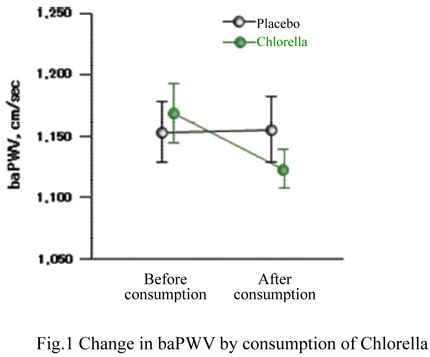- TOP
- List of reports
- A Study on Anti-Arteriosclerotic Effects of Chlorella in Man
A Study on Anti-Arteriosclerotic Effects of Chlorella in Man
【Scientific information】
Research and Development Department, Sun Chlorella Corporation
A Study on Anti-Arteriosclerotic Effects of Chlorella in Man
Presented at the 10th General Meeting of the Japanese Society of Anti-Aging Medicine (2010)
- Study Objectives
- Increased arterial stiffness (progression of arteriosclerosis) due to aging is one of the factors involved in elevation of blood pressure and is a risk factor for cardiovascular diseases. On the other hand, it has been reported that the blood pressure in patients with mild to moderate hypertension was lowered by consumption of Chlorella (Merchant et al, 2002). In this study, we verified the hypothesis that arterial stiffness is decrease by consumption of Chlorella.
- Method of experiments
- A crossover study was conducted in 21 healthy male adults by a blind method. The subjects were instructed to take 15 tablets of Chlorella tablets or placebo tablets twice a day (30 tablets in total) for 4 weeks, and brachial-ankle pulse wave velocity (baPWV*) was determined before and after the consumption period. The same experiment was performed by changing the tablet taken after a withdrawal period of at least 8 weeks.
- Results
- baPWV did not change before to after consumption of placebo tablets (11.4 ± 0.2 vs 11.5 ± 0.3 m/s, P=0.90) but was significantly decreased in the Chlorella consumption group (11.6 ± 0.2 vs 11.1 ± 0.2 m/s, P<0.01) (Fig.1). These results suggest that consumption of Chlorella for 4 weeks improved arterial stiffness.
- * baPWV: This parameter is positively correlated with arterial stiffness.

Presentation at a scientific meeting
- Name of meeting:
- The 10th General Meeting of the Japanese Society of Anti-Aging Medicine (2010)
- Title:
- An interventional study on the anti-arteriosclerotic effect of Chlorella in man
- Presenters:
- Takeshi Otsuki1), Kazuhiro Shimizu2, 3), Motoyuki Iemitsu4), Yukari Arakawa5) and Ichiro Kono2)
- Affiliation:
- 1) Graduate School of Sports Health Science, Ryutsu Keizai University, 2) Graduate School of Comprehensive Human Sciences, University of Tsukuba, 3) Faculty of Sports Sciences, Waseda University, 4) College of Sport and Health Science, Ritsumeikan University, 5) Sun Chlorella Corporation





